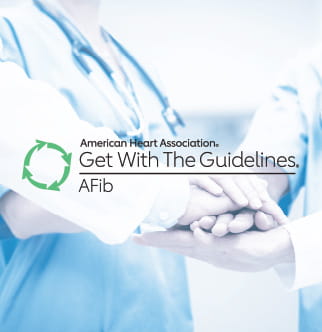National AFib Awareness Month

Reducing The Impact of AFib Together
The Importance of Improved Care
Without treatment, Atrial Fibrillation can lead to blood clots, stroke, heart failure, and other heart-related complications. Compared to people without, AFib patients experience:
- 5x increased risk of stroke
- 3x increased risk of heart failure
- 2x increased risk of dementia
Growing Numbers
Before the Covid-19 pandemic, AFib numbers in the US were on the rise. In 2001, experts predicted the number of Americans living with AFib would double by 2050. Today, those numbers are further exacerbated by the impacts of the virus. Research suggests AFib is likely to influence more Americans, and could put more people at greater risk of stroke and heart failure than previously expected.
Articles of Interest

Importance and Improvement in CHA2DS2-VASc Documentation
September 8th | 12:00 - 1:00pm CST
Join as we review the importance of CHA2DS2-VASc Score documentation for AFib
patients. Learn how Stanford Health Care
and Northwestern Memorial Hospital have implemented process improvement
initiatives around CHA2DS2-VASc Score documentation as well as
utilizing Get With The Guidelines®-AFib data to improve outcomes.

AFib Ablation: Who, What and Why?
September 21st | 12:00 - 1:00pm CST
From patient selection and current guidelines to safety and efficacy, Dr. Jackson will walk through important details and recommendations regarding AFib ablation. Plus, we'll take a high-level look at the dynamics of health equity at play, along with post-ablation management and care. Attendees will walk away with new understanding applicable to their day-to-day patient care.
Plug In With Podcasts
Learn the importance of creating administrative buy-in, setting up an AFib clinic, and creating a multidisciplinary team to better treat patients and improve outcomes.

Join the Conversation on Social Media
Patient Resources & Guidelines
Three Things You Can Do Today
Consult the Data
Inquire with your quality improvement leaders, or dig into existing registries. Is your hospital seeing significant numbers of stroke and heart failure patients with AFib?
Talk to Your Cardiology Team
Three questions to ask:
- What is the AFib patient throughput?
- What AFib-specific protocols are used hospital-wide?
- Are patients receiving guideline directed therapy at discharge?
Raise Awareness
Share the materials and information found on this page. Consider emailing AFib Month information to internal stakeholders.
Distribute AFib-related education on your social media. Leading the conversation increases public education and improves understanding.

Get With The Guidelines® - AFib
Designed to assist hospital care teams in consistently providing the latest evidence-based treatment for their AFib patients. The program also offers a means of monitoring the quality of AFib care in U.S. hospitals to build a database for continued research and further quality improvement.Get With The Guidelines-AFib Hospital Recognition
Hospitals that participate actively and consistently in Get With The Guidelines®-AFib are eligible for public recognition. It's an opportunity to hone a competitive edge in the marketplace by providing tangible evidence of your commitment to quality care.
Congratulations to our recognized hospitals.